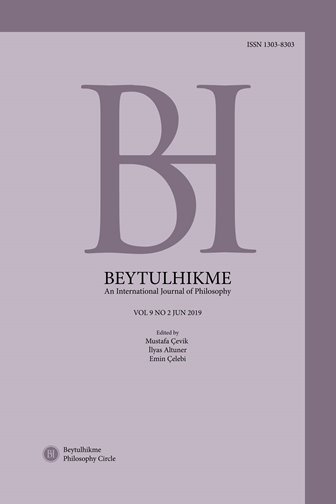Author :
Abstract
Çalışmanın ilk kısmında, biyolojik verilerin yorumlanmasına dair üç problem olarak perspektifin öznelliği, jargonun antroposentrizmi ve çalışmaların perspektif-güdümlülüğünü Heiddegerci bir perspektiften tartışmaktayım. Akabinde, ahlaki işlevselcilik karşısında ahlaki davranışların niyetsellik içerdiğini savunmakta ve hayvan davranışlarına dair gözlemlerin hayvanlarda niyetsel ahlak olduğu şeklinde yorumlanamayacağını vurgulamaktayım. İkinci kısımda kalıtım çalışmalarındaki özelliklerin tanımlarının muğlâklığını ele almaktayım. Genetiğin özelliklere olan katkısının abartılması, azımsanması ve gözden kaçırılması şeklinde, kalıtım çalışmalarının üç yöntemsel kusuruna dikkat çekerek bu çalışmaların tanımları neredeyse muğlâklık içermeyen özellikler konusunda da verimli olmadığı kanaatini dile getirmekteyim. Felsefeye kıyasla biyolojiye öncelik verilmesi fikrine katılmayarak, çağdaş biyoloji felsefesinde felsefenin, yorumlama konusunda yöntemsel olarak öncelikli olduğunu sonucuna varmaktayım.
Keywords
Abstract
In the first part of the study, I discuss three methodological problems of the interpretation of the biological data, namely subjectivity of perspective, anthropocentrism of jargon and perspective-orientation of the studies. Then, I defend intentionality of moral acts against the functionalist morality, emphasizing the interpretation of the observations on animal behavior cannot assume that animals have intentionality. In the second part, I review the ambiguity problem of the traits in the heritability studies. I voice the argument that the heritability studies do not work for the traits with well-circumscribed definitions as well, pointing out three methodological shortcomings of the studies, i.e., overestimation, underestimation and omission of the genetic contribution to the traits. Disagreeing with those who give priority to biology, I conclude that, methodologically philosophy should be prior in the interpretation regarding the contemporary philosophy of biology.
Keywords
- Baldwin, D. A. (1991). Infants’ contribution to the achievement of joint reference. Child Development, 62, 875-890.
- Bouchard, Thomas J. Jr. (2013). Genetic Influence on Human Psychological Traits. Arguing About Human Nature (eds. Stephen M. Downes and Edouard Machery). New York: Routledge, 139-144.
- Butler, J. (2004). Undoing Gender. New York: Routledge.
- Carpenter, M., Akhtar, N., & Tomasello, M. (1998). Fourteen– through eighteen– month–old infants differentially imitate intentional and accidental actions. Infant Behavior and Development, 21, 315-330.
- Dahlstrom, D. O. (2013a). Darwinism. The Heidegger Dictionary. London and New York: Bloomsbury, 51-52.
- Dahlstrom, Daniel O. (2013b). Ontic. The Heidegger Dictionary. London and New York: Bloomsbury, 146.
- De Waal, Frans (2003). Good Natured: The Origins of Right and Wrong in Humans and Other Animals. (7th printing ). Massachusetts: Harvard University Press.
- Heidegger, M. (2001). Being and Time. (trans. by John Macquarrie & Edward Rob- inson). Oxford: Blackwell.
- Lakatos, I. (1970). History of Science and Its Rational Reconstructions. PSA: Proceedings of the Biennial Meeting of the Philosophy of Science Association, 1970, 91-136.
- Pinker, S. (2003). The Blank Slate: The Modern Denial of Human Nature. New York: Penguin Books.
- Prinz, J. J. (2012). Beyond Human Nature: How Culture and Experience Shape Human Mind. New York and London: W. W. Norton & Company.
- Silk, J. B., Brosnan, S. E, Vonk, J., Henrich, J., Povinelli, D. J., Richardson, A. E, Lambeth, S. P., Mascaro, J., and Schapiro, S. J. (2005). Chimpanzees are indifferent to the welfare of other group members. Nature, (7063), 437, 13571359.
- Wright, W. (1998). Born That Way: Genes, Behavior, Personality. New York: Routledge. Öz: Çalışmanın ilk kısmında, biyolojik verilerin yorumlanmasına dair üç problem olarak perspektifin öznelliği, jargonun antroposentrizmi ve çalışmaların perspektif-güdümlülüğünü Heiddegerci bir perspektiften tartışmaktayım. Akabinde, ahlaki işlevselcilik karşısında ahlaki davranışların niyetsellik içerdiğini savunmakta ve hayvan davranışlarına dair gözlemlerin hayvanlarda niyetsel ahlak olduğu şeklinde yorumlanamayacağını vurgulamaktayım. İkinci kısımda kalıtım çalışmalarındaki özelliklerin tanımlarının muğlâklığını ele almaktayım. Genetiğin özelliklere olan katkısının abartılması, azımsanması ve gözden kaçırılması şeklinde, kalıtım çalışmalarının üç yöntemsel kusuruna dikkat çekerek bu çalışmaların tanımları neredeyse muğlâklık içermeyen özellikler konusunda da verimli olmadığı kanaatini dile getirmekteyim. Felsefeye kıyasla biyolojiye öncelik verilmesi fikrine katılmayarak, çağdaş biyoloji felsefesinde felsefenin, yorumlama konusunda yöntemsel olarak öncelikli olduğunu sonucuna varmaktayım. Anahtar Kelimeler: Yorum problemi, işlevsellik, ahlak, özelliklerin muğlâklığı, özelliklerin kalıtımsallığı.





